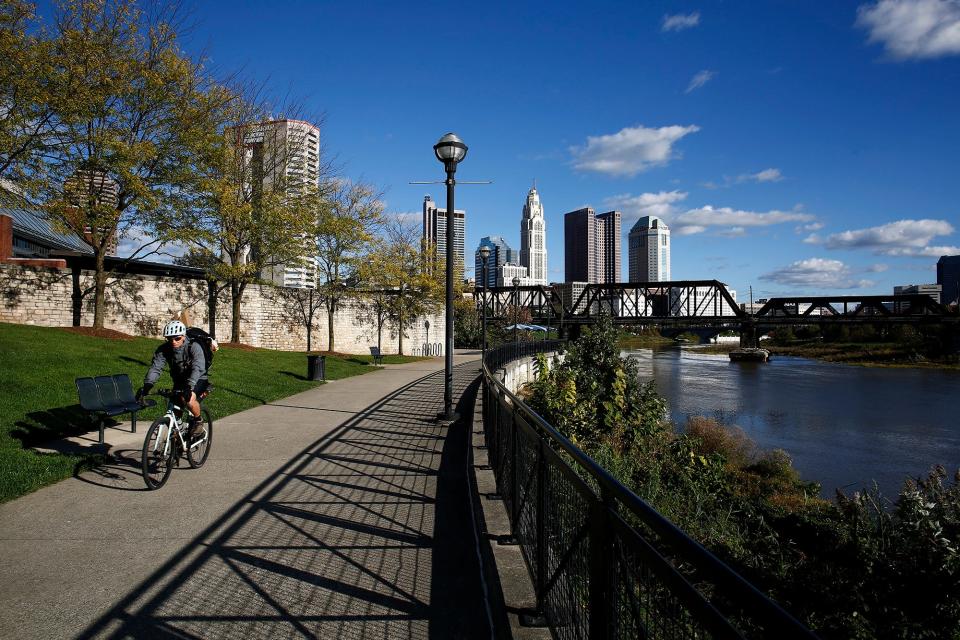Columbus should allow cyclists to use sidewalks. City erred when ignoring bikes on Sinclair Road.

Cyclists need sidewalk option along dangerous roads
Regarding the Feb. 6 article "Cyclists want Columbus to allow bikes on certain sidewalks and inclusion in road upgrades," I am surprised to read that the city of Columbus did not plan for a multi-use trail as part of a major improvement of Sinclair Road. It was not that many years ago that the Sinclair Road planning began, and over these years the city has been modifying many other city streets to accommodate bike lanes and other cycling infrastructure.
Councilmember Barroso de Paddilla, chair of the Public Service and Transportation Committee, commented that perhaps the city code could be revised to allow bicycles to operate on certain specific sidewalks where roads are deemed too dangerous. It's probably fairly easy to create definitions of dangerous roads, but perhaps the most sensible city code would be to simply state that when a cyclist feels a road is too dangerous, they have the discretion to use a sidewalk. Then qualify the code by stating that pedestrians have right-of-way. Cyclists could then be given citations according to the standard pedestrian right-of-way codes that cars and cyclists must obey when pedestrians are legally using a crosswalk.
Assuming that city planning is not already required to take into account the need to provide cyclists with safe cycling space on or next to streets, this type of planning needs to be a requirement.
Lou Flocken, Worthington

Columbus needs path on Sinclair Road
Why are Columbus residents in neighborhoods subjected to lack of foresight and vision by city officials when addressing public mobility improvements? For this reader, it is inconceivable for the project on Sinclair Road to move forward when interim Public Service Director Kelly Scocco is quoted as saying “...looking back, it probably should have been a shared-use path on one side of the road. I'm not going to debate that."
How long is too long? Columbus has ignored dangers on Sinclair Road for decades.
City residents deserve better than being subjected to errors in design in perpetuity.
Carl Faller, Columbus

Parents, put your phones down
“Dad, put the phone down and play with me!” My 6-year-old son recently called me out, desperate for the attention of his all-too-often, nonphysically present and emotionally aloof parent.
We work to pay bills that will cyclically return, volunteer sometimes out of a sense of obligation and live in the constant fear that a moment missed on a social media feed may lead to missing the ever-important celebrity gossip or food selfie from a distant acquaintance. We are generations of adults too focused on escaping our reality via an unreal digital world. This leads us to lose out on the vibrant interpersonal connections standing in front of us with their toothless grin and their basketball in hand, ready to play.
So please parents, grandparents, children, and neighbors, let’s disconnect from our digital worlds and our one dozen social media followers and reconnect with those directly around us. Join me in enjoying the influence these real-life connections have in our daily lives.
Trevor Eide, Pickerington
School closure plan needs tranparency
The Columbus City Schools has acknowledged that enrollment has steadily declined since the peak in 1971 when it served 110,725 students. For 2024, enrollment is 45,547 students in 117 schools.
In 2005, the Columbus Board of Education voted to close 11 schools. In 2009, another 9 were to be closed. In 2016, six elementary schools were considered for closure. In 2018, the task force recommended closing 5 schools.
So, once again a “task force is to study and make recommendations to the school board by June, with implementation of final decisions by August 2025”.
What happened to the previous schools? Were they closed? Were the buildings and properties sold? Will the schools to be closed in 2025 be sold? And what were the proceeds from any previous sales and how were they spent? This type of information should be made available completely and honestly to the citizenry - it’s called transparency and is severely lacking.
Meanwhile, the board will have use of the $100 million raised annually from the property taxes of Columbus residents.
The board continues to fail in leadership to the disappointment and abject dismay of students and families in the Columbus community.
No wonder the enrollment in CCS has plummeted.
Ruth W. Johnson, Columbus
Share your thoughts: How to submit a letter to the editor for The Columbus Dispatch
Stop Ohio's death penalty
The suffocation of citizens by gassing should not be tolerated in Ohio or anywhere in the country. As Ohio Attorney General Dave Yost says (at 35 minutes) in his news conference where he is advocating for new legislation to allow for execution by nitrogen, “The system actually works as it’s designed to do, I wouldn’t call it well, but as it’s designed to do”.
Thank you, Mr. Yost for admitting what so many Ohioans believe and understand. Indeed, the system “does not work well” and we the people want to fix the criminal justice system and not waste everyone’s time to jumpstart capital punishment after a 6-year moratorium.
Recent polling shows a majority of Ohioans answered “yes” when asked if Gov. DeWine should replace capital punishment with a life sentence without the possibility of parole for the most heinous crimes. Given this, Ohio lawmakers should respect the voters and denounce legislation that advocates for a method of execution that is unpopular, untested and has been cited as “an inhumane way to put down animals”. Accountability for capital crimes is an essential part of our judicial system, but ending the life of a perpetrator of such crimes through any lethal process is morally wrong.
Karen Jones, Bexley
Look for goodness in people
As an American Ahmadi Muslim, I would like to encourage my neighbors to reflect on the importance of Black History Month. It is worth acknowledging and celebrating shared values regardless of our race, religion or background.
Dr. Martin Luther King Jr. famously said, “I look to the day when people will not be judged by the color of their skin, but by the content of their character.” In Islam, this absolutely echoes with what Prophet Muhammad said in his farewell sermon, “A white has no superiority over a black, nor a black has any superiority over a white, except in piety and good action.”
This has ultimately served as a profound tenet of Islamic principles of equality for 1,400 years. In light of this advice, I would like to encourage our fellow Americans to look past race - something we cannot even choose - and instead look for goodness and piety in our fellow man.
Samar Ahmad, Pickerington
Israel has a legal right to exist
Farrell Brody of Columbus used a despicable technique of propaganda in his Sunday letter, writing, “Palestinians in Gaza and throughout the region have suffered from an illegal occupation for more than 75 years.”
Brody’s 75 years takes us back to 1949, the year of Israel’s first national election after its founding in 1948 following Nazi Germany’s unconditional surrender on May 8, 1945. U.S. foreign policy made us the first country to recognize Israel as an independent state on May 14, 1948.
Harvard University Press reports, “Nazi officials saw Islam as a powerful force with the same enemies as Germany: the British Empire, the Soviet Union and the Jews.”
The Palestinians picked the wrong side, lost the war and under military compulsion forfeited claim to land. The Versailles Treaty forced Palestinians’ allies in Nazi Germany to cede territory to Belgium, Czechoslovakia and Poland.
Brody, unlike U.S. foreign policy and United Nations policy, cowardly implies that Israel has no legitimate right to exist or to defend itself.
Palestinian leaders weren’t willing to accept the two-state solution offered by the Oslo Accords because, like Brody, they refused to accept Israel’s right to exist as a Jewish state.
Joseph Eric Peters, Columbus
This article originally appeared on The Columbus Dispatch: Bikes on sidewalks? Cyclists deserve safe path on Sinclair Road

